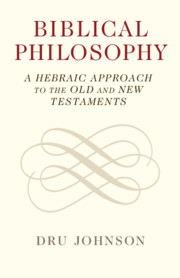Book contents
- Biblical Philosophy
- Biblical Philosophy
- Copyright page
- Dedication
- Contents
- Figures
- Tables
- Acknowledgments
- A Case for Retrieving Hebraic Philosophy
- Part I Philosophical Styles
- Part II Hebraic Philosophy
- Part III Persistence in Hellenistic Judaism
- Part IV Prototypes of Hebraic Philosophical Arguments
- 8 Hebraic and Scientific Epistemology
- 9 Biblical Truth and Human Logic
- 10 Pictures of Justification
- Ending with a Beginning
- Bibliography
- Index
9 - Biblical Truth and Human Logic
from Part IV - Prototypes of Hebraic Philosophical Arguments
Published online by Cambridge University Press: 13 April 2021
- Biblical Philosophy
- Biblical Philosophy
- Copyright page
- Dedication
- Contents
- Figures
- Tables
- Acknowledgments
- A Case for Retrieving Hebraic Philosophy
- Part I Philosophical Styles
- Part II Hebraic Philosophy
- Part III Persistence in Hellenistic Judaism
- Part IV Prototypes of Hebraic Philosophical Arguments
- 8 Hebraic and Scientific Epistemology
- 9 Biblical Truth and Human Logic
- 10 Pictures of Justification
- Ending with a Beginning
- Bibliography
- Index
Summary
If the scientific epistemology parallels Hebraic epistemology in any significant way, then the conceptual paradigms of truth and the mechanics of justification could – or, perhaps, should – follow suit. The Hebraic model of "truth" that emerges differs at key points from some, but not all, of our folk notions of truth today. Specifically, the true/false binary that funds current and popular models of justification appears to be too rigid a model for the Hebraic style. I examine a Hebraic notion of truth and justification in the Hebrew Bible and the New Testament. Although I will put both truth and the logic of justification in conversation with contemporary ideas, I do so only to show both the kinship we share with biblical notions, and the critique offered from the biblical texts.
Keywords
- Type
- Chapter
- Information
- Biblical PhilosophyA Hebraic Approach to the Old and New Testaments, pp. 264 - 287Publisher: Cambridge University PressPrint publication year: 2021

